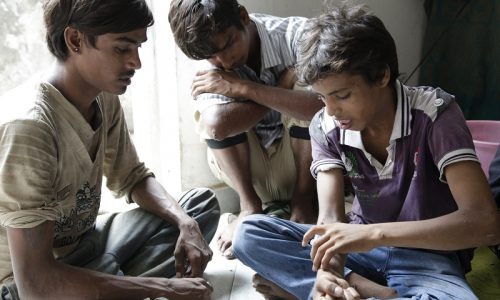
3 reasons why we must prioritise human dignity and health rights of people who inject or use drugs
The moral and legal lens to drug abuse fuels social stigma and discrimination
India has estimated 850,000 people who inject drugs of which an alarming number of 460,000 are children. Apart from this reality, there are also an additional 1.8 million adults who need help for inhalant dependence and around 7.7 million Indians require help for opioid dependence (All India Institute of Medical Sciences (AIIMS). The moral and legal parameter to judge a person dependent on drugs is a double-edged sword that exhibits judgment and punishment more than it does empathy and compassion. And the punishment perhaps is not the best approach to correction. The moral outlook makes the people dependent on drugs seem morally weak and inferior beings leading to curtailing of their human and health rights. In turn, they become disempowered sometimes even losing their lives. Reintegrating them back in society also becomes a challenging process.
Most at risk of contracting HIV, hepatitis C (HCV), and other sexually transmitted diseases but among those with the least access to support and treatment services
People who inject or use drugs are one of the key populations that are considered at higher risk of HIV, the reasons for their increased vulnerability can be attributed to needle or syringe sharing, criminalisation, social exclusion and poverty. Within the key populations considered high-risk groups, people who inject or use drugs are the most vulnerable and hard to reach. They are 22 times at higher risk of HIV compared with the general population. Individuals dependent on drugs get very little support from their family members or society as they are unable to comprehend the actions individuals take to satisfy their urge for drugs. “He was my only son, but I had started wishing that he would die… And now, I cry the whole night with his photograph in my hand,” says 55-year-old Lakshmi Devi in Punjab. There is an urgent need for preparedness and awareness among community health systems to respond to the health requirements of people who use drugs. The state and district level law-enforcement officials need to be engaged meaningfully in creating the enabling and stigma-free environment to increase the uptake of health services among people who use drugs. If the health needs of people dependent on drugs go unattended, it puts the health of the larger population also at risk.
Increased vulnerability due to COVID-19 pandemic impacting the socio-economic equilibrium
There could be several reasons for drug abuse depending on the individual’s immediate or social environment. The most common reasons behind drug abuse are the desperate need to manage stress, peer pressure, and to get momentary high. In India, drug abuse is closely linked to poverty and hunger. The COVID-19 pandemic has hit economies hurting the lifeline of those at the lowest rung of the economic pyramid. The stress and pressure of the COVID crisis increase the vulnerability of already marginalised communities like people who use drugs as they grapple with the loss of livelihood, strained relationships and unable to access or afford illicit drugs. While our healthcare systems are burdened with coronavirus patients, we run the danger of overlooking treatment and healthcare services for people dependent on drugs.
The state government of Punjab has claimed that unable to access drugs, more than 129,000 drug users came forward to enrol in government and private de-addiction centres across Punjab over 89 days during the lockdown. It has always been challenging to trace people who use drugs but if they are proactively seeking help, this could be the best time to build that connection and prioritise their physical and mental health requirements.
In the post-COVID-19 world, the supply of drugs is disrupted which has led to a hike in the cost and most people from the low-income background cannot afford it. In absence of drugs, the long term drug users experience withdrawal symptoms such as severe body pains, vomiting, insomnia, diarrhoea, etc requiring treatment to manage these symptoms. Charanjit Sharma, a senior staff of Alliance India who belongs to the community of people who use drugs and working as a manager in Harm Reduction programme said, “This will increase the treatment coverage among people who use drugs and even if they stop coming after a while, because of the connection already established, a follow up will be easy as they are already aware and can access the service delivery centres.” However, unless we prioritise the human dignity and health rights of people who use drugs, this opportunity may be lost.
Integrated harm reduction services have proven to be the most effective in HIV prevention and improvement of the overall wellbeing of the people who use drugs
To tackle the drug abuse problem, India launched Drug-De-addiction Programme (DDAP) with the aim to reduce demand for drugs in 1985. Over the last three decades, India is working towards expanding the services in all aspects. India, like many other countries, is tackling the drug problem at three different fronts: supply reduction, demand reduction and harm reduction.
Harm reduction refers to a strategy to reduce the harms resulting from drug abuse by providing integrated healthcare services, counselling and awareness services with not necessarily abstinence from drugs. In India, harm reduction strategy is a component of HIV prevention most specifically among people who inject drugs to prevent HIV transmission and reduce the harms that may result from drug use or drug overdose. The harm reduction services include – condom distribution, community-based outreach, peer-led interventions, needle and syringe programmes and opioid substitution therapy. Accessing these services in a stigma-free environment could drastically improve the treatment coverage among this highly vulnerable and marginalised population and contribute to curbing HIV and meeting India’s 95:95:95 targets in HIV response. Unfortunately, India remains the 3rd largest country with people living with HIV.
The work at hand is to expand harm reduction services to not only people who use drugs but to also their sexual partners who are equally vulnerable, sensitizing and building the capacity of community health systems, sensitising the state and district law enforcement agencies, empowering the community of drug users for self-advocacy, and capacity building of community-based organisations for an integrated approach to healthcare and HIV services.
At the policy level, continued and sustained advocacy for the decriminalisation of people who use drugs and demand to roll back the punitive laws remains a priority as it will be a more sustainable approach and have positive impacts to the issue. In India Narcotic Drugs and Psychotropic Substances Act, 1985 (NDPS Act) prohibits the cultivation, production, possession, sale, purchase, trade, import, export, use and consumption of narcotic drugs and psychotropic substances except for medical and scientific purposes under the law. The NDPS Act was enacted to provide adequate penalties for drug trafficking, strengthen enforcement powers, implement international conventions to which India was a party, and enforce controls over psychotropic substances. The NDPS Act supports treatment for people who use drugs both as an ‘alternative’ to, and independent of criminal measures. Several provisions stipulated under the Act de-penalise consumption and offences involving small quantities of drugs, and encourage treatment-seeking. Instead of sentencing a drug-dependent person convicted for a low-level drug offence to imprisonment, the court may, after assessing the individual’s background (socio-economic) and health status and obtaining consent, remand her/him to a treatment facility. Till date, few people, if any, have benefited from this provision. Drug users are either not aware or incapable of exercising their rights and they end up behind bars in a pitiable condition. This requires engaging with the district and the state level law-enforcement agencies meaningfully.
~ Written by Tara Rana, Communication Officer, Alliance India
1. https://www.avert.org/professionals/hiv-social-issues/key-affected-populations/people-inject-drugs
2. https://www.bbc.com/news/world-asia-india-46218646
3. https://www.indiaspend.com/unable-to-get-drugs-during-lockdown-punjabs-addicts-are-quitting-but-this- may-not-last
Recent Blog
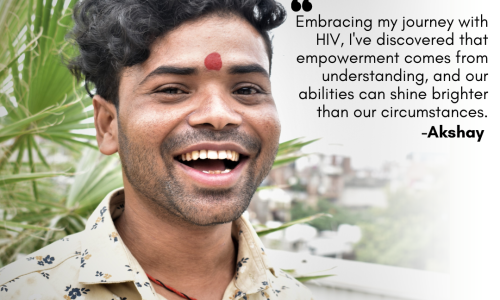
Empowering Lives Overcoming HIV Misinformation with Determination and Hope:
At 22 years old, Akshay firmly believes that life revolves around the lessons you acquire and the abilities
Read More...
22 Aug 2023
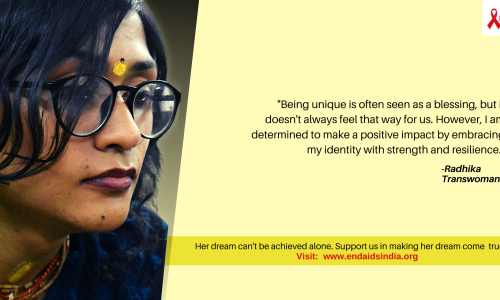
Building an Inclusive World: Empowering the Trans Community Together:
Hi, I am Radhika. I face many challenges as a Trans woman when it comes to finding my
Read More...
20 Jul 2023
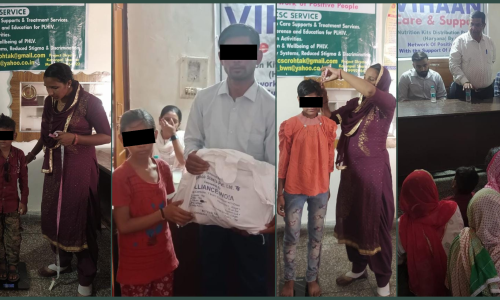
Empowering Young Warriors: Nutrition Kits for Children Living with HIV:
We're thrilled to share the success of our recent nutrition kit distribution to children living with HIV (CLHIV)
Read More...
12 Jul 2023
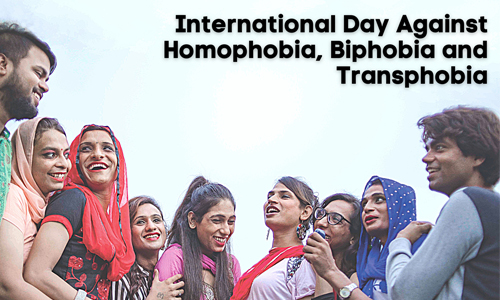
The Struggle of Embracing Identity International Day Against Homophobia Transphobia and Biphobia:
"I've never had an interest in fading into the background and becoming invisible. Let's start with this powerful
Read More...
17 May 2023
